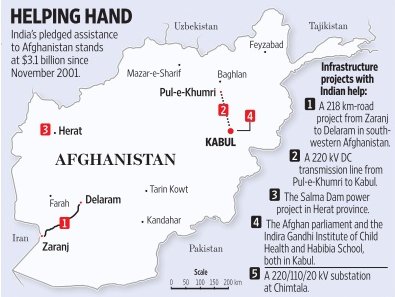International Relations
India’s Position Shift on Taliban
- 14 Sep 2020
- 5 min read
Why in News
Recently, India has signaled a shift in its position on engaging with the Taliban by participating in the commencement ceremony of Intra-Afghan talks between the Afghanistan government and the Taliban in Doha, Qatar.
Key Points
- India’s Position Shift:
- The Indian presence at the Intra-Afghan peace talks indicates that it has changed its position given the ground reality in Afghanistan and the changing power structure in Afghanistan.
- USA's withdrawal has given Pakistan a major role to play in Afghanistan directly or indirectly through its proxies.
- However, some experts were of the opinion that India chose to attend the ceremony because the Afghan government was also at the table.
- India still does not recognise the Taliban.
- The Indian presence at the Intra-Afghan peace talks indicates that it has changed its position given the ground reality in Afghanistan and the changing power structure in Afghanistan.
- India’s Stand:
- India believes any peace process must be Afghan-led, Afghan-owned and Afghan-controlled. i.e.
- It has to respect the national sovereignty and territorial integrity of Afghanistan and promote human rights and democracy.
- It also needs to preserve the progress made in the establishment of a democratic Islamic Republic in Afghanistan.
- The interests of minorities, women and vulnerable sections of society must be preserved and the issue of violence across the country and its neighbourhood has to be effectively addressed.
- Indian interests, which include the Indian Embassy and Indian companies and workers in Afghanistan, should also be protected.
- India supports an "independent and sovereign" Afghanistan.The use of words “independent and sovereign” make it clear that Pakistan and the Inter-Services Intelligence (ISI) should not control the levers in Afghanistan.
- India believes any peace process must be Afghan-led, Afghan-owned and Afghan-controlled. i.e.
- Background:
- The USA signed a deal with the Taliban that paved the way towards a full withdrawal of USA troops from Afghanistan and also represent a step towards ending the 18-year-war in Afghanistan.
- The peace deal was expected to kick-off two processes- a phased withdrawal of US troops and an ‘intra-Afghan’ dialogue.
- The deal is a fundamental step to deliver a comprehensive and permanent ceasefire and the future political roadmap for the Afghanistan peace process.
- India’s Interests in Afghanistan:
- India has a major stake in the stability of Afghanistan. India has invested considerable resources in Afghanistan's development. E.g. the Afghan Parliament, the Zaranj-Delaram Highway, Afghanistan-India Friendship Dam (Salma Dam) among others.
- Afghanistan is the gateway to Central Asia.
- Issues Involved:
- India is concerned about the Taliban’s links with Pakistan’s ISI and efforts by the latter to use the Haqqani network to target India’s interests in Afghanistan.
- India’s Afghanistan policy continues to be assessed vis-a-vis Pakistan, which opposes any security role for India in Afghanistan and sees India’s presence there as detrimental to its interests.
- Taliban also has link with Jaish-e-Muhammad (JeM) and Laskar-e-Toiba (LeT) who are behind various terrorist activities against India.
- India still does not recognise the Taliban. However, if it considers the option of entering into direct talks with the Taliban, it would constitute a major departure from its consistent policy of dealing only with recognised governments.
- India is concerned about the Taliban’s links with Pakistan’s ISI and efforts by the latter to use the Haqqani network to target India’s interests in Afghanistan.
Way Forward
- India needs to re-evaluate its decisions and be more omnidirectional in its approach to deal with all forces that are central to the future of Afghanistan.
- The changing political and security situation requires India to be more open to adapting its maximalist position and starting a dialogue with the Taliban.





